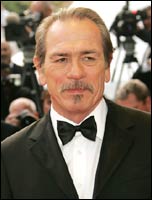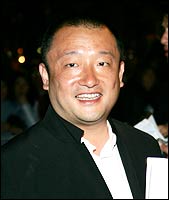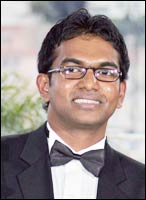Uma da Cunha, the wellknown casting director without whose guidance movies like Octopussy, The Sea Wolves, Holy Smoke, Monsoon Wedding etc would not have been made, was a keen observer at Cannes 2005. In this feature, exclusive to rediff.com, she record her impressions about the most prestigious film festival in the world.
 Films in competition at the 58th Cannes Film Festival this year expressed just a handful of themes, instead of the immense diversity of other years. A journalist asked why this happened at the jury's post-awards press conference.
Films in competition at the 58th Cannes Film Festival this year expressed just a handful of themes, instead of the immense diversity of other years. A journalist asked why this happened at the jury's post-awards press conference.
Film after film bespoke the need for parenting, especially the father's role, or they were road films, with strangers behind the wheel ordering a person's mindset, or people in humdrum suburban life were suddenly visited by the unknown and eerie, or 'nobody-is-what they-seem.'
Jury President Emir Kusturica said these subjects reflect the undercover insecurities of our existence today. They are valid themes
Cannes 2005: The Full Coverage
At the start of the festival, he had said the jury would look for such reality in the films, along with 'good aesthetics (form) and comprehension by the public.' The Palmares (awards) were in line with these criteria.
The Palme d'Or winner L'Enfant (The Child), from the Dardennes brothers Jean-Pierre and Luc (Belgium), is a film about a 20-year-old person, living on petty crime, forced to face the emotional responsibility of unexpected fatherhood with his 18-year-old girlfriend.
![]()
More on rediff.com!
![]()
![]()
![]()
![]()
The Last Sunil Dutt Interview ![]()
Special: Farewell, Duttsaab![]()
Sunil Dutt is no more!![]()
![]()
![]()
The film is inspired by Dostovesky's Crime and Punishment and Robert Bresson's Pickpocket. This was the brothers' second Palme d'Or. Their Rosetta, which won in 1999, looked at the searing world of unemployment in Belgium from a woman's point of view.
The Grand Prix winner, Jim Jarmusch's Broken Flowers -- for many, the film that should have won the top prize -- shows a return to this director's penchant for poignant comedy. In this film, the poker-faced melancholy of actor Bill Murray, as an ageing Lothario, is wonderfully used. He goes off on an insane road journey searching for a 19-year-old son he may have fathered. He finds not the son but himself -- and an unsuspected parental yearning.
 The Jury Prize went to Wang Xiaoshuai (right)'s wistfully evocative Shanghai Dreams, on the strict social taboos that a father inflicts on his daughter. They lead her to attempt suicide, a theme that echoes the larger issues of strictures on the individual in provincial China of the 1980s.
The Jury Prize went to Wang Xiaoshuai (right)'s wistfully evocative Shanghai Dreams, on the strict social taboos that a father inflicts on his daughter. They lead her to attempt suicide, a theme that echoes the larger issues of strictures on the individual in provincial China of the 1980s.
The Best Director Award went to Austrian Michael Hanake for Hidden, a strong favourite, his fourth French-language film. Set in Paris, the film follows a television presenter and his family who are sent covertly shot videos of their home and lives. The film unfurls France's treatment of its Algerian minority, also the protagonist's involvement and prejudices.
The Best Actor award went to Tommy Lee Jones (above, top) for the film he also directed, The Three Burials Of Melquiados Estrida. The film follows a Texas ranch foreman who makes it his mission to set right the thoughtless killing of his Mexican colleague by an over-zealous border patrolman. Although he finds that he has befriended a man who lived a pipe-dream in his personal life, the film ends on a positive note of self-discovery on both warring sides.
The strict rules applied in Cannes led to this film being withdrawn for the Camera d'Or award given to first-time filmmakers. It was learnt that Lee had directed a television feature film earlier. Two other directors were also debarred last-minute for similar reasons: James March with his Un Certain Regard entry 'The King' and Karin Albou's La Petit Jerusalem in the Critics Week.
Hannah Laslo won Best Actor (Feminine) for her role in Amos Gitai's disappointingly didactic film on self-eroding middle-east fanaticism, Free Zone.
She brings a stoic resoluteness and warmth to the film. "I am known as a comedienne in my country, Israel," said Laslo, "and it's great that Amos gave me a chance to prove that actors with a flair for humour have the same ability to express sorrow and tragedy."
 The Camera d'Or brought honour to neglected Sri Lanka. It was shared by director-writer Vimukhti Jayasundara (left) for his film The Forsaken Land, a stark, slow-moving and painfully effective portrayal of the desolation and desperate loneliness of a handful of people living in a deserted war-torn pocket of Sri Lanka.
The Camera d'Or brought honour to neglected Sri Lanka. It was shared by director-writer Vimukhti Jayasundara (left) for his film The Forsaken Land, a stark, slow-moving and painfully effective portrayal of the desolation and desperate loneliness of a handful of people living in a deserted war-torn pocket of Sri Lanka.
The film has a poetic visual quality to it and a folk tale that drives its narrative. The other Camera d'Or winner Miranda July's already acclaimed Sundance entry Me, You And Everyone We Know, also looked at loneliness, but this time in a fun-driven quirky way of life in big city Los Angeles.
The Un Certain Regard entry Nordeste looks at a well-off French woman's agonised trip to Argentina in her burning need to adopt a new-born baby. There, she confronts the reality of poverty and deprivation and what it does to the unborn child and their needy mothers.
Two high-profile films evoked mixed reactions. One is David Cronenberg's A History of Violence, a tale of a hidden past being rekindled by an encounter which brings untold brutality to a close-knit family living in a peaceful small town.
Lars von Trier's Manderlay is a scholarly study about a settlement of slaves which led to the activist heroine realising that freedom from serfdom can bring about renewed enslavement of those meant to be freed.
Photographs: Getty Images






 © 2025
© 2025